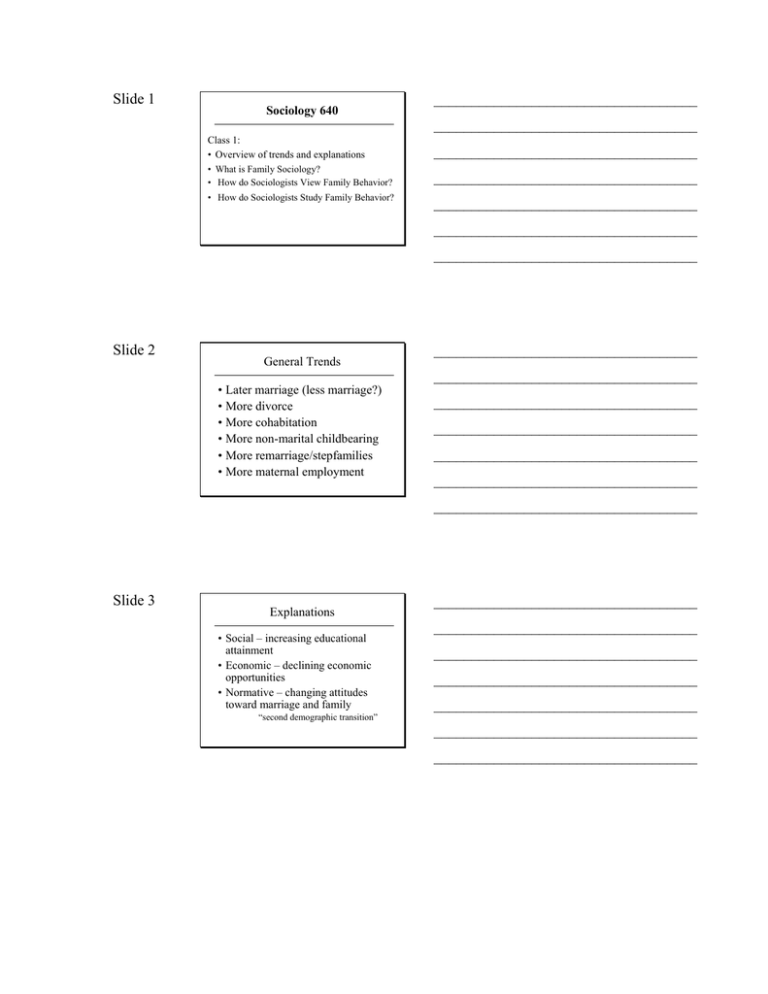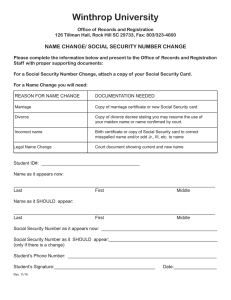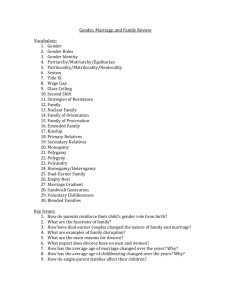Slide 1 ___________________________________
advertisement

Slide 1 Sociology 640 ___________________________________ ___________________________________ Class 1: • Overview of trends and explanations ___________________________________ • What is Family Sociology? • How do Sociologists View Family Behavior? ___________________________________ • How do Sociologists Study Family Behavior? ___________________________________ ___________________________________ ___________________________________ Slide 2 General Trends • Later marriage (less marriage?) • More divorce • More cohabitation • More non-marital childbearing • More remarriage/stepfamilies • More maternal employment ___________________________________ ___________________________________ ___________________________________ ___________________________________ ___________________________________ ___________________________________ ___________________________________ Slide 3 Explanations • Social – increasing educational attainment • Economic – declining economic opportunities • Normative – changing attitudes toward marriage and family “second demographic transition” ___________________________________ ___________________________________ ___________________________________ ___________________________________ ___________________________________ ___________________________________ ___________________________________ Slide 4 Questions for thought • What does it mean to say the family is “in decline”? • What do you think? Is the American family in decline? Is it “evolving”? • What about other countries you may know? What about subgroups of the U.S. population? • Is family change a bad thing? A good thing? • What do you feel are the most important reasons for family change between 1960 and 2000? • Is “family decline” inevitable or can it be slowed/stopped via policy measures? • Can it be slowed/stopped via other mechanisms? ___________________________________ ___________________________________ ___________________________________ ___________________________________ ___________________________________ ___________________________________ ___________________________________ Slide 5 A couple of comments on Popenoe • Definition of family is both unconventional and conventional. • Unconventional in criteria for meeting definition of “family” – but this is clearly acknowledged • Conventional in definition of what a family does – Functions or role in social organization – Reproduction, socialization, provision of care/love/companionship, pooling of economic resources, sexual regulation. • Stacey’s approach to family is intuitively appealing but, if seriously adopted, would make family sociology research exceedingly difficult. ___________________________________ ___________________________________ ___________________________________ ___________________________________ ___________________________________ ___________________________________ ___________________________________ Slide 6 What is Family Sociology? ___________________________________ ___________________________________ Study of complex set of relationships between society, individuals, and families. Interested in both causes and consequences of family behaviors. Interested in causes and consequences at both macro and micro levels. ___________________________________ ___________________________________ ___________________________________ ___________________________________ ___________________________________ Slide 7 ___________________________________ What is Family Sociology? Societal Forces Other Individual Characteristics ___________________________________ ___________________________________ Other Individual Characteristics Individual & Family Other Char. Characteristics Family Behavior ___________________________________ ___________________________________ ___________________________________ ___________________________________ Slide 8 ___________________________________ Trend Toward Later Marriage Economic, cultural change Other Individual Characteristics Education, earnings, attitudes, sex, cohab., etc. ___________________________________ Other Individual Characteristics Other Char. ___________________________________ Later age at marriage ___________________________________ ___________________________________ ___________________________________ ___________________________________ Slide 9 Sociological Approach to Analysis of the Family ___________________________________ ___________________________________ 1. Derive testable hypotheses from theoretical framework(s) 2. Locate/collect data most appropriate for testing of hypotheses 3. Analyze data to confirm or reject hypotheses 4. Recognize inherent limitations (importance of using various theories, methods, and data) ___________________________________ ___________________________________ ___________________________________ ___________________________________ ___________________________________ Slide 10 An important point ___________________________________ ___________________________________ • Family sociology, as with all social sciences, is ultimately interested in averages and variations. • Individual cases are important,but only to the extent that they allow us to generalize. – Developing an appreciation of this insight is perhaps one of the most important practical goals of this class • Relative advantages and disadvantages of survey data and ethnographic data. ___________________________________ ___________________________________ ___________________________________ ___________________________________ ___________________________________ Slide 11 Theoretical Frameworks for Studying the Family ___________________________________ ___________________________________ • Functionalism • Exchange Theory ___________________________________ • Conflict Perspective ___________________________________ • Symbolic Interaction ___________________________________ • Feminist Theory ___________________________________ ___________________________________ Slide 12 Study of the Family Analysis of variation and change • Historical approach • Comparative approach • Group differences • Life Course approach ___________________________________ ___________________________________ ___________________________________ ___________________________________ ___________________________________ ___________________________________ ___________________________________ Slide 13 Data used to Study the Family • Survey data – – – – Random sample Large scale Allows for generalization Allows for comparison of many groups • Ethnographic data – Usually non-random sample – Small scale – Allows for much more nuanced analysis ___________________________________ ___________________________________ ___________________________________ ___________________________________ ___________________________________ ___________________________________ ___________________________________ Slide 14 Methodological notes • Pay attention to the variety of measures cited in these early articles. • For example: – divorce rates vs. probability that marriage ends in divorce – proportion of children living in single-parent families vs. likelihood of ever living in a singleparent family vs. proportion of childhood spent in single-parent family – Mean age at marriage vs. median age at marriage vs. proportion never marrying ___________________________________ ___________________________________ ___________________________________ ___________________________________ ___________________________________ ___________________________________ ___________________________________ Slide 15 What does Family Sociology contribute? • Attempts to accurately describe trends/changes in family behavior (e.g., emergence of nuclear family, emergence of cohabitation). • Recognizes complexity of factors influencing family change/variation. Attempts to theoretically untangle causal relationships (e.g., attitudes and divorce). * Recognizes that correlation does not imply causation (e.g., women’s education and marriage). • Attempts to objectively assess implications of family behavior and changes therein (e.g., impact of divorce/stepfamilies on children). (But see Cowan note for alternative view) ___________________________________ ___________________________________ ___________________________________ ___________________________________ ___________________________________ ___________________________________ ___________________________________ Slide 16 More questions for thought • Are you optimistic about family change over the next 30 years? Pessimistic? • What do you think will be important family changes/issues for your generation? • What do you think will be important family changes/issues for you? ___________________________________ ___________________________________ ___________________________________ ___________________________________ ___________________________________ ___________________________________ ___________________________________


